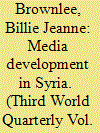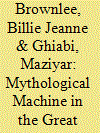|
|
|
Sort Order |
|
|
|
Items / Page
|
|
|
|
|
|
|
| Srl | Item |
| 1 |
ID:
154791


|
|
|
|
|
| Summary/Abstract |
This article intends to provide responses to some of the many unanswered questions about the making and the transformation of the uprising in Syria by exploring a new avenue of research: media development aid. Most academic interest has been oriented towards the role that the new media played at the time of the uprising; insufficient interest, by contrast, has been directed to the development of the sector in the years predating it. What emerges from this article is that the Syrian media landscape was strongly supported by international development aid during the years prior to the outbreak of the uprising of 2011. By looking at the complex structure of media aid architecture and investigating the practices and programmes implemented by some representative organisations, this article reflects on the field of media development as a new modus operandi of the West (the EU and US especially), to promote democracy through alternative and non-collateral, bottom-up support.
|
|
|
|
|
|
|
|
|
|
|
|
|
|
|
|
| 2 |
ID:
180010


|
|
|
|
|
| Summary/Abstract |
The article revisits ‘sectarianism’ as an epistemic venue within the context of a Great Civil War in the Middle East (2001-2021), a label that includes the overarching narratives of political life in the aftermath of 9/11 up to the aftermath of the so-called ‘Arab Spring.’ By introducing the notion of the ‘mythological machine,’ it argues that ‘sectarianism’ is a myth, something that does not exist in real terms, but which has real world effects. The mythological machine is a device that produces epiphanies and myths; it is a gnoseological process, which has cultural, social and political effects through the generation of mythological facts and, as a machine, it does so through both guiding and automatized mechanisms. Through this interpretive shift, the article proceeds through several theoretical steps using a variety of cases from across West Asia and North Africa, contextualizing them within global political events. Firstly, the article argues that it is ‘civil war,’ shaped by the work of the mythological machine that governs state-society relations and transnational politics in the Middle East. Then, the article discusses how the mythological machine incorporates a semantic othering via mythological thinking, speak and practice that shapes the perception and experience of civil wars. To conclude, the article discusses how the mythological machine displaces people’s status in the context of civil wars leading to the emergence of new forms of belonging and nation-making. Ultimately, the mythological machine creates what Giorgio Agamben defines as a state without people, a condition exhausting the value of citizenship and the political.
|
|
|
|
|
|
|
|
|
|
|
|
|
|
|
|
|
|
|
|
|